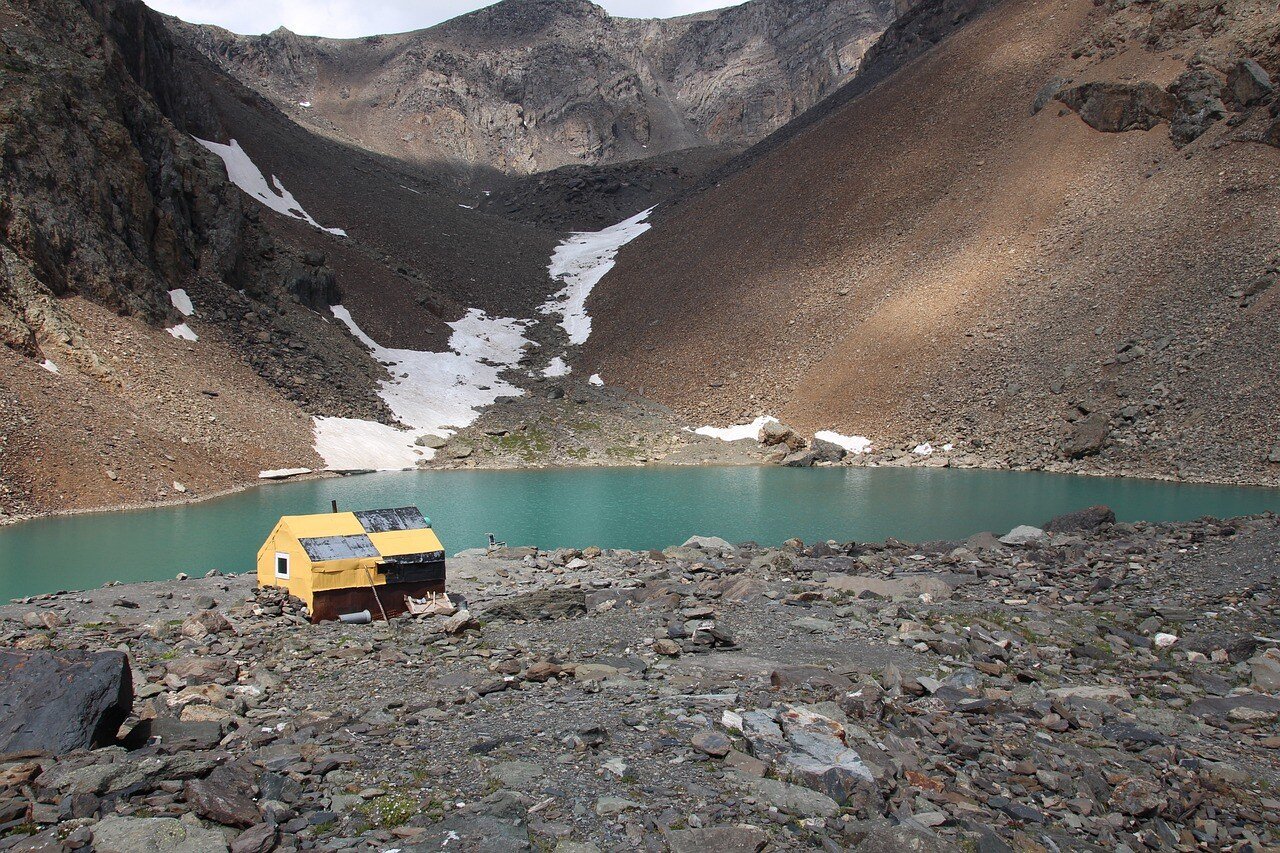Subscribe to our newsletter
Don't miss out on our latest updates.
Discover the highest paying geology jobs in 2026, from hydrogeology to geoscience, this article discusses it all. Read more!


In this article, we'll give you a low down on the highest-paying geology jobs in 2026, taking a closer look at each profession, job description, and potential earnings.
“Geology is the study of pressure and time.”
This saying is not the actual definition of Geology by any means. Instead, it's a quote from Shawshank Redemption, a 1994 movie that used rocks, crystals, and concrete to demonstrate the main character's persistence and resilience.
It’s a poetic version of Geology's true meaning- studying the Earth's history, structure, composition, and evolution—which took time and pressure.
If you are fascinated with how the Earth was formed and its economic, societal, and developmental implications, then this is an excellent career path to consider.
In addition to the fascinating world of laboratory, analytical, and technical work, the Geological sector's job outlook is also bright.
According to BLS, about 2200 job opportunities will open up every year for the next decade, and this faster-than-average growth is all due to the increasing need for energy and environmental protection as well as proper land and resource management.
That said, here are the top 10 high paying geology jobs that will pique your interest.

A geophysicist is a scientist who studies the Earth's physical aspects and its natural processes to map geological faults for earthquake preparation and discover new oil, water, mineral, and gas sources.
To perform their responsibilities, geophysicists should be well-versed in magnetic, electrical, gravity, and seismic methods.
Geophysicists' work environment is quite flexible since they conduct both laboratory work and office jobs.
They also work in different settings, including mining sites, gas and oil companies, engineering and architectural firms, consultancy services, government agencies, and the research and development industry.
At least a Bachelor's degree is required for a Geophysicist position.
However, the majority of employers may also look for candidates with Master's or PhD degrees or at least three years of experience.
On the other hand, an MBA or BBA degree will provide you with the business know-how needed to set up your own consultancy company.
Geophysicists earn an average of USD 118,500 per year, making it one of the highest-paying geology jobs in Nigeria and the US.
Drilling engineers are a vital part of the petroleum industry because they plan, manage, and oversee the drilling of oil and rig companies.
They play an important role in every step of the drilling process—from designing and building the well to operating it.
More than that, their job may also include discovering well-drilling methods and practices that are economical, eco-friendly, and safe.
Usually, drilling engineers are employed by offshore oil platforms and mobile drilling units for supervisory positions in charge of monitoring the drilling team's performance and productivity.
You need a bachelor's degree in engineering (mechanical, mineral, civil, or chemical) or geology is to enter this profession.
While it's not required, gaining a master's degree in engineering (coursework should include hydrogeology and reservoir engineering) may also help. Enrolling in an MBA or BBA degree can equip you with the leadership skills you need to head a team.
Drilling engineers make an average salary of USD 113,600 per year.
Hydrogeologists use their understanding of the movement of water through the rock, soil, and Earth’s crust to promote water sustainability and provide safe drinking water to humans.
Some of their responsibilities include discovering, measuring, and locating water sources.
They are also knowledgeable in assessing and maintaining water quality and exploring different methods to harness geothermal energy.
Lastly, they are responsible for designing and constructing water wells and addressing mining-related groundwater issues.
Due to the vital role they play in the environment, hydrogeologists can work in a wide range of industries and organizations, including but not limited to:
Environmental Consulting firms,
Government Agencies (Environmental Protection Agency and US Geological Survey),
Mining and Energy Sector,
NGO’s,
Agricultural Industry,
Water Treatment Companies or Firms,
And Water Management Organizations.
The minimum educational requirement for this industry is a Bachelor’s degree in science, majoring in geology, marine science, or environmental science).
It’s recommended that you take up a master’s degree or any postgraduate program to improve your marketability.
The median wage of a Hydrogeologist is around USD 100,800 per year.
An exploration geologist plans and goes on expeditions to discover and collect usable minerals and find potential deposits.
Afterwards, they use specialized scientific equipment to analyze the minerals' quality and assess their value.
Aside from joining expeditions, they also formulate comprehensive plans for extraction, drilling, and mining the said minerals.
In addition to mining companies, exploration geologists can also work for:
Natural resource companies
Specialty consultancy firms
Research and analysis institutes and universities
This role requires a bachelor's degree in geology and years of relevant work experience.
However, a master's or doctorate can make your resume look more competitive.
Additionally, some states require licensing, which involves continuing education and an examination.
Exploration Geologists earn an average salary of USD 100,700 per year.
Geoscientist is the umbrella term for scientists who study the Earth’s physical aspects. This profession is divided into different categories, including:
Geophysicists: This is the highest paying geology job we tackled in the list's first part.
Geochemists study the chemical composition of soil, rocks, and other natural resources and how they move into and affect our water systems.
Seismologists focus on the Earth's movement to understand and predict earthquakes and tsunamis and find ways to protect people from these natural phenomena.
According to the Bureau of Labor Statistics, the job market for geoscientists will grow by 5% until 2032, which is faster than the average of all the other geology jobs in this list.
To get an entry-level geoscientist position, you only need a degree in geology, geosciences, physics, or another related field.
For senior geoscientist and management jobs, it's ideal that you have a master's or doctorate and a BBA/ MBA degree.
A geoscientist's estimated average pay is around USD 96,200 per year.
The main job of an engineering geologist is to study the Earth’s natural processes and their effects on developmental structures to prevent property damage and preserve human life.
They are typically brought in during the planning stage of a construction project to assess the geological stability of the real estate development sites using land surveys and other methods of environmental studies.
Engineering geologist jobs require a geology or environmental engineering degree.
On the other hand, high-level positions require an advanced degree like Master’s.
Getting an engineering geology license is essential, and the license type may vary depending on your experience.
Fresh graduates can become licensed as an Engineering Intern (EI) or Engineer in Training (EIT). Once you've earned enough relevant experience, you can get the Professional Engineering (PE) license.
The estimated total pay for an Engineering Geologist is about USD 93,500 per year.
Petroleum geologists are the types of geologists who have in-depth knowledge and expertise when it comes to finding natural fuel fossil deposits that are needed for manufacturing petroleum.
They conduct field studies to collect and analyze readings that can guide them to potential oil deposits.
Additionally, they use different scientific methods and a wide range of technology to develop estimations on how much fuel can be extracted safely from a particular location.
A petroleum geologist works as part of a team. They do the exploring while the petroleum engineers work in the extraction process.
Most petroleum engineers work at drilling well sites of gas exploration companies.
Typically, the minimum educational requirement for a petroleum geologist is a degree in geology or a related field like geochemistry or geophysics. However, a master's or doctorate degree can be an asset if you want higher positions.
The estimated pay for a Petroleum Geologist is around USD 90,000 per year.
Also called Mudlogging geologists, Wellsite Geologists work at oil and gas sites to analyze and understand the geological formations encountered during the drilling process.
They derive geological data from the different rock samples and drill cuttings to help them make informed decisions regarding the construction project's sound location and proper drilling methods.
They are also responsible for geosteering to determine the right drilling direction to help oil and gas companies optimize hydrocarbon recovery and minimize potential risks.
A geology degree and a few years of relevant experience working as a mudlogger, driller, or technician can help you get a Wellsite Geologist position.
However, it’s important to note that some employers prefer candidates with a Master's degree in petroleum geoscience, geochemistry, or geological engineering.
Wellsite Geologists receive a median wage of USD 86,1 00 per year.
While engineering geologists understand the history of soil and rock and how it changes over time, Geotechnical Engineers are more well-versed in the engineering side of things—the structure's design and construction.
Their goal is to ensure the construction process is planned with geotechnical considerations.
To do this, they evaluate the land for safety and tackle the design and construction aspects like slope stability, foundation design, and retaining structures.
Aside from buildings, other infrastructure projects that require the assistance of a Geotechnical Engineer include the development of roads and tunnels and onshore and offshore mining and drilling operations.
To get an entry-level position, you need a bachelor’s degree in geotechnical engineering or engineering.
On the other hand, you need to earn a higher degree or post-degree graduate certificate and a Professional Engineer license to apply for managerial positions.
On average, Geotechnical Engineers make around USD 85,500 per year.

Environmental Consultants are the specialists that companies consult to ensure that the potential changes on their operations and processes adhere to environmental regulations.
They conduct environmental audits to minimize and prevent the businesses’ negative impact on the environment and help them preserve human health and uphold ecological safety.
Lastly, they are in charge of formulating waste management policies for businesses.
To become an environmental consultant, you must attain a bachelor's degree in geology, ecology, or environmental science and an environmental consulting internship.
To specialize in a specific area, you'd need a master's degree in environmental science, management, and health. Earning a few environmental management certifications would also be a good idea.
The median wage for an Environment Consultant is around USD 78,000 per year.
The geological industry is one of the few sectors wherein a Bachelor's degree is sufficient to land you a job. However, it's essential to note that this degree will only get you an entry-level job and will come with limited career opportunities.
Because of this, the best way to thrive in this sector is to attain higher degrees and obtain certifications that will show future employers that you have up-to-date skills and comprehensive knowledge needed to take on more advanced positions.
Getting an MBA or BBA degree is also recommended to show off your strong leadership skills, and in-depth economic know-how, and find jobs that pay well.
If you are ready to take your geology career to the next level, an MBA or BBA from Nexford is a great starting point. Their online programs are an excellent way to upgrade your skills despite your busy schedule.
Geophysicist is the highest paying geological job. Geologists in this position earn as low as USD 112, 000 and as high as USD 201,000, with an average annual salary of USD 118, 500.
The fastest-growing geological job to watch out for in 2026 and beyond is being an Environmental Consultant/ Specialist.
According to BLS, the demand for these positions will grow by 6% until 2032. This growth is equivalent to about 6,900 job openings yearly for over a decade.
Geology can be a rewarding career if you have a great interest in science, the environment, and natural resources and are passionate about solving problems, and data analysis.
Here are some of the reasons why you should consider a career in geology:
Good growth potential (BLS projects a growth of 5% from 2022 to 2032)
Several career opportunities
Exciting work schedule and nature
Excellent salary prospects (Highest pay can go as high as USD 200,000)
Wide range of specialization (including seismology, petroleum, and even the academe)
If you wish to enjoy all these fantastic perks, then you should consider becoming a geologist in the future.
With the nature of their jobs, becoming a geologist is challenging. To become successful and qualify for these lucrative geological jobs, you need to have a specialized set of soft and hard skills.
The hard skills you need to develop include knowledge of industry guidelines and scientific methods, analytical skills, technical know-how, specialized computer system operation, and geological mapping.
On the other hand, the soft skills needed are communication, interpersonal, and collaboration skills. To get higher positions, you must develop good leadership skills.
In most geology professions, a Bachelor’s degree is the minimum requirement for entry-level jobs.
To qualify for higher-paying positions, a master's or doctorate with the right specialization and years of relevant field experience is necessary.
Lastly, getting an MBA or BBA degree is a massive bonus for anyone who wishes to land a managerial, supervisory, or leadership position.
Getting a BBA/ MBA degree can open up many employment opportunities for a geologist.
While a career in geology is focused on sciences and laboratory work, which a Bachelor's degree can cover, all the decisions and activities in this industry still come with an economic parameter and significance, which are the things that an MBA or BBA degree tackles.
These degrees will demonstrate your diversified skill set, giving you an edge over your competitors.
Don't miss out on our latest updates.
Invest in yourself and your future. Discover our range of degrees, courses, and certificates to achieve your goal
.png)
Choosing to pursue an online degree while juggling a career and life in Florida is a significant ...
Read more →
The abundant potato crop is not the only gem in the Gem State. Its outdoor activities, beautiful ...
Read more →
From the moment the first PC was created by IBM in 1981, and then after years of subsequent ...
Read more →
Difference Between Entrepreneur and Intrapreneur In short, entrepreneurship is the act of creating ...
Read more →
10 Ways to Develop and Improve Leadership Skills 2026 1. Develop active listening to understand ...
Read more →
Highest Paying Master's Degrees in Nigeria - Top 10 1. Master's in Business & Data Analytics ...
Read more →